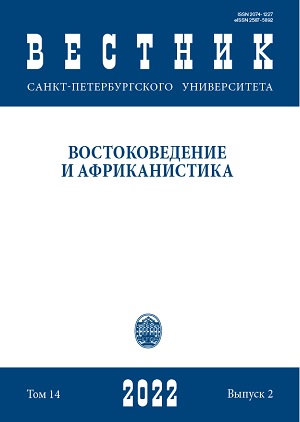Taboo Words as a Component of Invective Vocabulary and Their Determining in Arabic against the Background of Russian and English Languages
DOI:
https://doi.org/10.21638/spbu13.2022.209Abstract
The paper is devoted to understanding of the taboo phenomenon in language as a component of invective vocabulary on the example of Arabic, English and Russian languages, and also to study of the borders of this phenomenon and methods of its determination. In his study of conceptual features of forbidden words the author of the article refers to the works of K. Allen and K. Burridge, as well as M. Ljung. In addition to the theoretical works of linguists, the author analyzes the existing practice of implementing linguistic prohibitions in Russian, English, which affects such areas as legislation and media. Especially valuable material that was analyzed, was studies of English-speaking media regulators and major broadcasting companies. The main purpose of these surveys was to identify the list of words that audience considered unacceptable on the air, i.e. taboo. As for Arab law, there is no separation of vocabulary on permissible and unacceptable, as well as there is no obvious border and in Arabic language standards or usage. However, this does not mean the lack of prohibited words and the author clearly demonstrates the presence of taboos on examples from Arab media. In addition, the article discusses the works of Arab linguists M. A. Khatyab and N. Ya. Kanbar, dedicated to taboo vocabulary. Nevertheless, the problem of reliable determination and identification of language taboos has not been solved yet, and the author of the paper proposes a relevant criterion to determine the taboo words on the basis of the approaches existing in modern linguistics.
Keywords:
taboo, invective, Arabic language, English language, Russian language, taboo indicator
Downloads
References
Downloads
Published
How to Cite
Issue
Section
License
Articles of "Vestnik of Saint Petersburg University. Asian and African Studies" are open access distributed under the terms of the License Agreement with Saint Petersburg State University, which permits to the authors unrestricted distribution and self-archiving free of charge.





